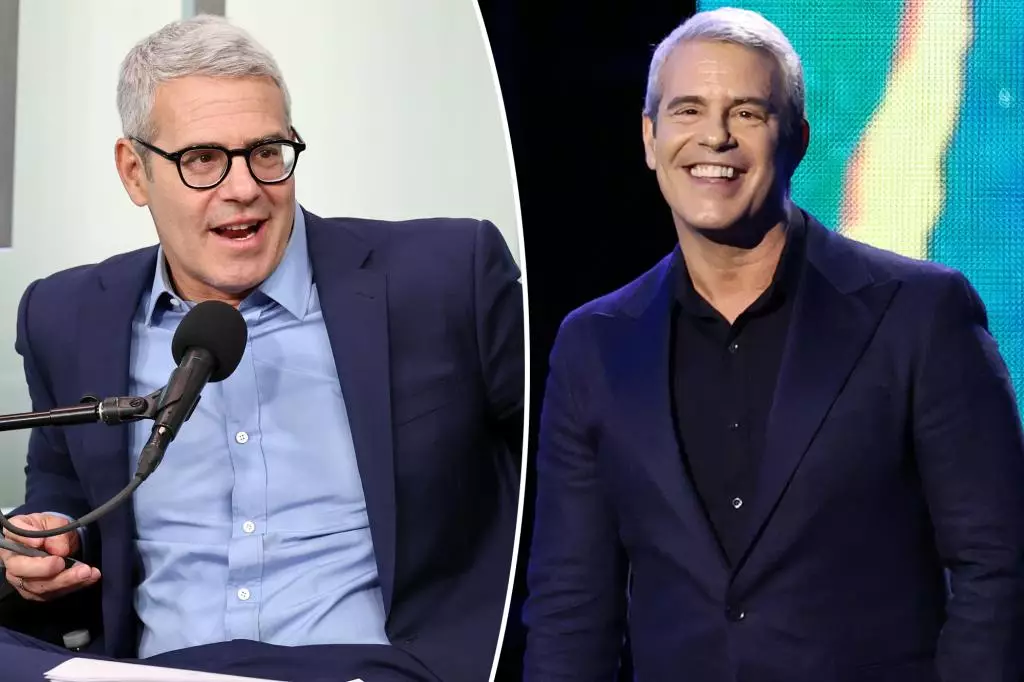In an era where self-care has evolved into self-empowerment, Andy Cohen’s recent admission of venturing into the realm of injectables is not just newsworthy but also a reflection of changing societal perceptions regarding masculinity and aesthetics. The iconic Bravo host, long known for his sharp wit and candid interactions, has historically sidestepped cosmetic enhancements, dismissing Botox as something exclusively for women. Yet, on the stage of the “Married to Medicine” Season 11 reunion, Cohen surprised viewers and his peers alike by revealing that he had finally taken the plunge into Botox treatments.
Cohen’s light-hearted banter with Dr. Contessa Metcalfe not only served as a humorous icebreaker but also highlighted an important conversation about men’s beauty routines. Typically bound by outdated societal norms dictating how they should present themselves, men have long been stifled by the stereotype that takes aesthetic enhancement as a sign of weakness. However, Cohen’s embrace of this treatment sets a precedent, empowering other men to explore similar avenues without shame or hesitation.
The Response from Peers Reveals Underlying Attitudes
During the reunion, the playful exchange about who gets more Botox—Cohen or Metcalfe’s husband—serves as a perfect microcosm of a larger cultural narrative. Dr. Metcalfe’s playful acknowledgment of her husband’s reluctance to follow suit underscores a lingering hesitation among men to succumb to societal beauty standards. Meanwhile, Cohen’s candid confession, “I just got it for the first time in my life,” illustrates not only his personal journey but also a broader shift in attitudes toward male beauty and grooming.
The reactions of his fellow cast members were equally telling. Contessa’s enthusiasm and Toya Bush-Harris’s lively invitation for Cohen to come experience the benefits in Atlanta reveal a support network often absent in conversations about male cosmetics. On the contrary, Dr. Simone Whitmore’s warning—”They’ll have your face frozen”—introduces a tone of caution, reminding viewers that while cosmetic enhancements can be enjoyable, they should also be approached with sparseness and care.
Criticism and the Call for Change
Interestingly, Andy Cohen’s journey isn’t without its critics. His past inquiries about plastic surgeries faced backlash from viewers who argue that such questions perpetuate an outdated culture of scrutiny towards women’s choices. Critics state this practice is not only invasive but also insensitively reinforces gender stereotypes by suggesting that women must justify their appearances. Cohen’s defense—that questions regarding aesthetic work remain popular among viewers—does little to alleviate the concerns that many have voiced regarding the implications of such discussions.
Cohen’s acknowledgment that “the HW have unabashedly let us into their beauty regimes since day one” can be seen as both a statement of intent and an excuse for perpetuating narratives that may no longer serve us. Unfortunately, what should be a fun and light-hearted exploration of beauty rituals often tends to tread into murky territory, where individual choices are scrutinized rather than celebrated as personal expressions of individuality.
By stepping into the world of injectables himself, Cohen embodies a turn in this narrative, inviting men and women alike to reevaluate their aesthetics without fear of judgment. It’s a powerful departure from traditional expectations, urging society to embrace a more inclusive conversation about beauty—one where the focus lies on personal empowerment rather than conformity. In doing so, Cohen may very well help pave the way for a future where aesthetic enhancements are regarded as just another form of self-care, free from stigma and laden with positivity.

